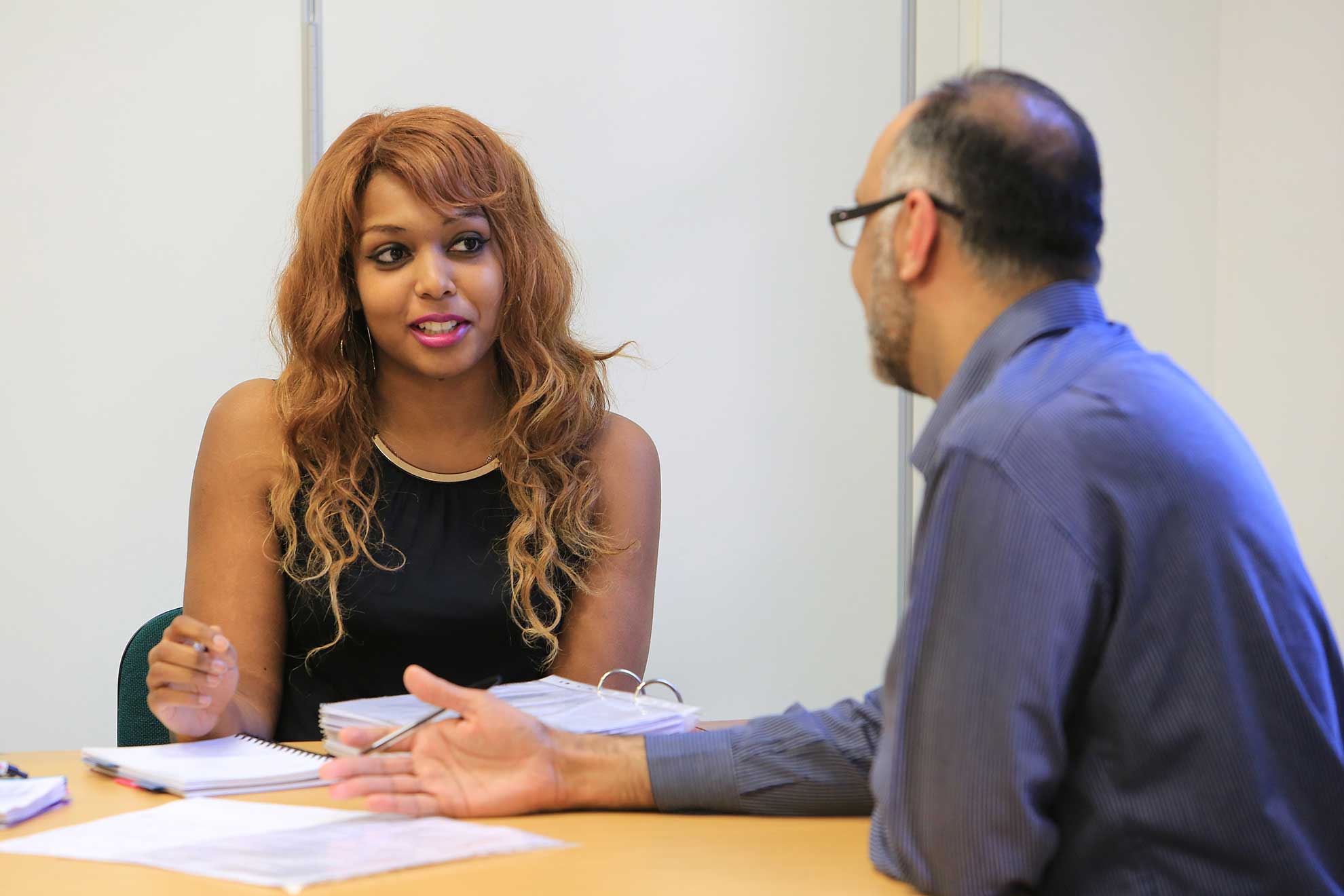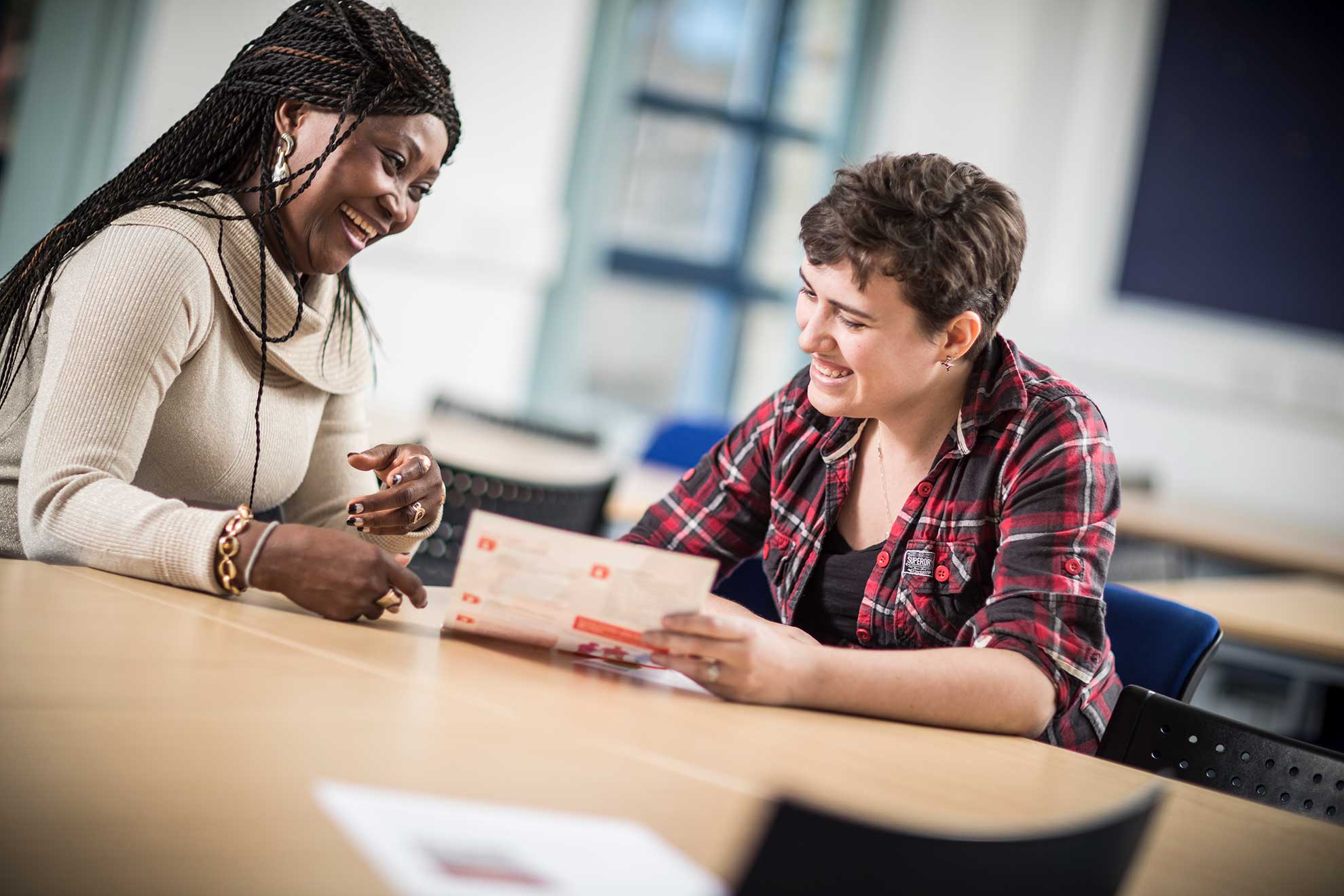The learning support process
If you have not accessed the University’s Disability Services, this will be your first step to finding out about support. You will need to make an appointment with a Disability Adviser to discuss your needs.
In this appointment, an Adviser will discuss any barriers to your learning and may suggest booking an appointment with a Needs Assessor. A Needs Assessor is a specialist who would take you through an assessment process to recommend the type and level of support you may require.
Find out more information on how to book an appointment by visiting our Disability support pages.
Steps to learning support

Seeking support
Think you need some support whilst studying? Take your first steps, with support from the Disability Services team.

Disabled Students' Allowance entitlement
Visited an assessmment centre? Received your DSA entitlement? See what’s next.

Offer of learning support
Find out more about how the Learning Support team will contact you to offer you support.

Linking you with support
Accepted your support offer? Take a look at how we will link you to a support worker.

Meeting your support worker
In lectures, around campus? how you will meet with your support worker depends on your support.

Whilst receiving support
Your support is in place! What now? Find various information about the expectations on you in regards to your support.
Seeking support. Your first steps
If you have not accessed the University’s Disability Services, you will need to first make an appointment with them to discuss your needs.
Find out more information on how to book an appointment by visiting our Disability support pages.
Getting a DSA entitlement
If the Disability Services team has recommended you apply for DSA, they will guide you in organising an appointment with a specialist Needs Assessor.
After your assessment has taken place, your funding body (Student Finance England, for example) will be provided with the recommendations that the assessment centre has specified. They will review these recommendations and confirm who will provide the support, and what support is to be provided. A DSA entitlement letter, often referred to as a DSA2, will be sent to you at this point. The Disability Services team will also receive a copy of this letter.
If for any reason you may not be eligible for DSA, the University may be able to provide you with alternative support arrangements to ensure you get the support you need.
For more information on the Disabled Students’ Allowance, please see the gov.uk website.
Have you received your DSA entitlement letter?
If you have already received your DSA letter, and the University of Huddersfield is named as a provider of your support, please visit our offer of learning support section to find out what the next steps are.
Offer of learning support
Once the Disability Services team has processed your entitlement, it will be passed to the Learning Support team.
Depending on the support you are entitled to, the Learning Support team will send you an email formally offering you your ‘Non-Medical Helper’ support, based on your entitlement. This email will contain some information about the support we are offering and to ask your availability, which is required so that we can link you with a support worker who has the same availability as you. If there is a valid reason you cannot provide your availability, please do not worry – our support workers try to be flexible to this.
Have you already accepted the support, and let us know your availability?
If you have already accepted the support and we know when you are available, we will go ahead and link you with a support worker. For next steps, view our ‘linking with a support worker’ section.
Linking you with a support worker
Once you have accepted the support and provided us with the information we requested, the Learning Support team will start the process to link you with an appropriate support worker.
When a support worker confirms they have availability to support you, the Learning Support team will provide them with your contact details and they will get in touch with you directly. This will always be through your University email, or by the contact telephone number held on your student record. If you do not have a University email account, they will contact you by the email address you provided to the University (this applies mainly to applicants or those who have yet to enrol).
Depending on the time of year, and availability of support workers, we may need to add you to our waiting list. If this happens, we will link you as soon as a suitable support worker becomes available, or we may suggest an alternative way of accessing support.
We do not mind you contacting us to request an update on the progress of linking you with a support worker, but we do kindly ask you to wait at least 10 working days before making an enquiry.
Once you and your support worker agree a session time, you must attend this. The service is in high demand so If you start missing appointments regularly, without reason, it may have negative impacts on your support. Where necessary, the Disability Service may choose to suspend your support and offer your slot to a student who is on the waiting list.
Meeting your support worker
Depending on what type of support you receive, you may meet your support worker in different places. If you are meeting with a mentor or tutor, you will generally arrange to meet in one of our dedicated rooms in Student Central unless other arrangements are made with them.
Other support workers, like note takers, interpreters, or campus support, will meet you at your lectures or practical sessions, or out-and-about on campus. The meeting points will be pre-arranged with your support worker.
Do you have positive feedback about your support worker?
If you are happy with your support, it is always nice to know so please let us know! It is just as important that your support worker knows what they are doing well, just as much as what they can do to improve.
Are you unhappy with your support worker?
Unfortunately, from time to time, some students may have issues with the support they receive. If you feel like you want to discuss any issues, we highly recommend discussing this directly with your support worker where appropriate; they may be able to change the way in which they work to suit you. If you feel that this would be too difficult, contact the Learning Support team or Disability Adviser and we can look at arranging alternative support, where it is justified. It is important we know we know when you are unhappy as we need to let our support staff know how they can improve their services to all students.
Whilst receiving support
During the time that you are receiving support there are some things that will be expected of you, as part of the agreement. There are also things you are entitled to.
We do ask you to be mindful that Learning Support is in high demand and many students rely on the services of support workers. Where you do not engage as you should, it does mean another student may be missing out on a valuable service.
Missing sessions
Once you have arranged your sessions, we ask you to ensure you attend them. If you cannot make an appointment, you must inform your support worker and give at least 24 hours’ notice. If you are unable to provide 24 hours’ notice, your support worker will be paid for the session, and this will be deducted from your overall funding allocation.
Your DSA funding body imposes a 2-missed session limit per term and it may affect your support if you miss sessions. Continuously missing sessions without adequate notice may result in your support being put on hold and your place being offered to a student who is on the waiting list.
Managing timesheets
Once a session has taken place, you will receive a timesheet enabling you to approve or reject the session.
It is your responsibility to approve timesheets on Opus. As your support worker is contracted based on the support they provide you, as a courtesy to them, please approve timesheets as soon as you receive them to ensure that they are paid for their services to you. Consistently failing to approve timesheets may result in your support being suspended. Please visit https://youtu.be/vnz9wwLO2ME to familiarise yourself with how to use the Opus system.
Changing support worker
It is your right to request a change of support worker but please bear in mind that the request must be valid based on the support you receive. For example, if you feel the support workers style does not match your preferred style, we would expect you let your support worker know this in order to give them a chance to change their practice to suit you. If you have an issue such as a support worker has made you feel uncomfortable in any way, this would be valid enough reason to request a change of support worker.
Wherever you have an issue, we want you to feel you are able to tell Learning Support or your Disability Adviser, but we think it is reasonable that we see if we can resolve your issue first, before changing your support worker where appropriate.
Requesting specific support workers
Where it is possible, if you would prefer a specific support worker, for example if one has been recommended to you, we will consider placing you with them. Please note that this cannot be guaranteed and there will always be a valid reason if we cannot accommodate the request.
Professional boundaries
We expect that students and support workers maintain a professional boundary at all times. It is natural that you will form a bond with your support worker if you see them regularly and this is something we understand, but it is important to remind you that professional boundaries are important. Where you have an issue with a professional boundary, please contact Learning Support or your Disability Adviser. If Learning Support or your Disability Adviser become aware of professional boundary issues, we will take actions to ensure the issue is resolved quickly.